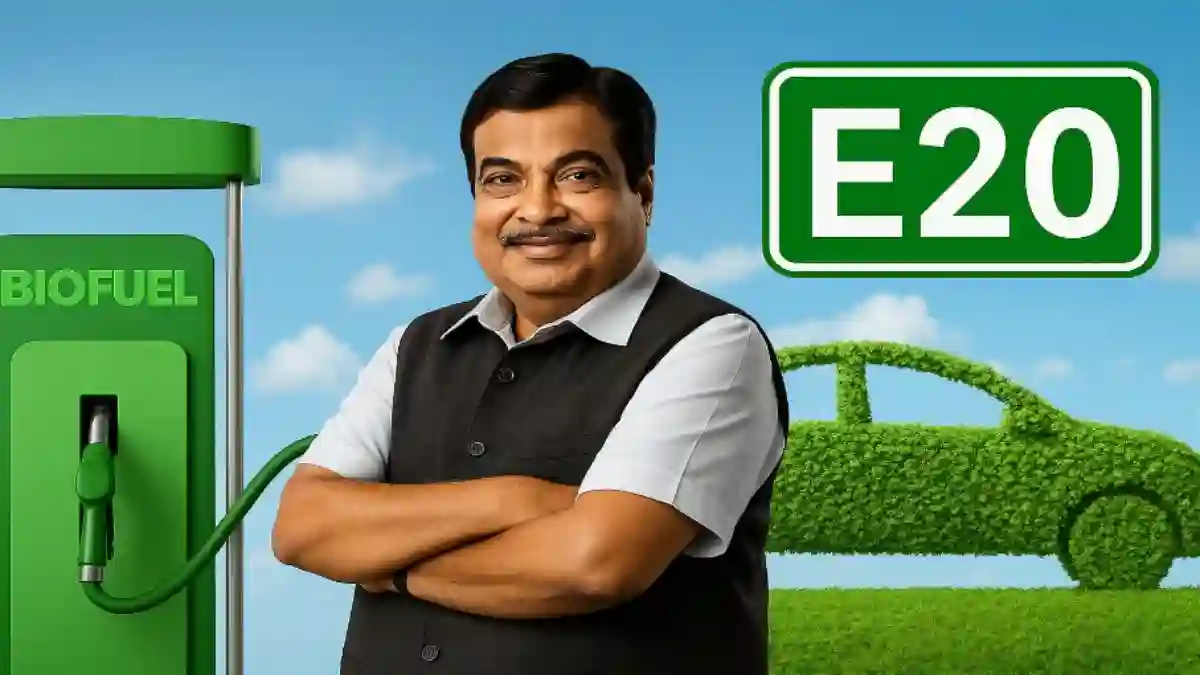
New Delhi – India’s ethanol blending push has been touted as a win-win policy reducing pollution, cutting oil imports, and boosting farmer incomes. Union Minister Nitin Gadkari has gone as far as declaring that “the fuel of the future will be 100% Bio Ethanol.” But behind the ambitious claims of cleaner energy lies a growing unease among vehicle owners, auto manufacturers, and even insurers. The transition to E20 petrol in India is raising more questions than answers.
Ethanol Blending: A Policy That Isn’t a Mass Issue
The majority of Indians don’t own cars, so ethanol blending is not a mass consumer issue. Instead, it is largely framed as an agricultural and environmental reform. The policy has indeed boosted incomes for sugarcane and maize farmers, who now have an assured market for their crops through ethanol production. In this sense, ethanol blending looks like a rural economic lifeline.
But the impact on the small percentage of Indians who do own vehicles cannot be brushed aside. While farmers gain, consumers are bearing hidden costs in terms of higher fuel prices, reduced efficiency, and long term damage to vehicles.
Why E20 Petrol Costs More
The Petroleum Ministry has made it clear that E20 petrol in India cannot be priced lower than regular petrol. This is because ethanol production involves higher input and transportation costs. Unlike crude oil, which benefits from economies of scale and global supply chains, ethanol production is fragmented and tied to seasonal crops.
So, despite being marketed as a “green” fuel, E20 petrol is not a cheaper alternative. In fact, consumers are paying more for a product that, ironically, delivers fewer kilometers per litre.
Ground Reality: Reduced Mileage and Engine Problems
Vehicle owners have already begun reporting a host of issues after using E20 petrol in India. Reduced mileage is the most obvious concern ethanol contains less energy per litre than petrol, leading to higher fuel consumption.
But the problems go deeper. Ethanol absorbs moisture from the air, which accelerates corrosion and rusting in fuel tanks. Even E10 bikes which were supposed to be compatible have faced complaints of engine jerks, misfires, and faster wear and tear.
For carmakers, this is a red flag. Toyota has refused warranty coverage for damage caused by E20 fuel. Insurers like Acko have also flagged ethanol related risks, leaving consumers exposed to financial losses.
Farmers Benefit, Consumers Pay
From the government’s perspective, ethanol blending is a strategic success. It reduces India’s oil import bill, cuts tailpipe emissions, and provides guaranteed income to farmers. But these gains are not evenly distributed.
Farmers benefit directly, but urban vehicle owners are forced to shoulder the hidden costs of policy driven experimentation. For middle class families already facing rising inflation, paying more for fuel that delivers less efficiency is not just inconvenient it feels unfair.
Conflict of Interest Questions
Adding to the controversy is the fact that Nitin Gadkari’s family has had stakes in ethanol businesses. While Gadkari has divested his personal holdings, the overlap raises questions about conflicts of interest in policymaking. Can a government minister objectively promote ethanol blending when his family is financially tied to the industry? Even if technically above board, such linkages erode public trust.
Suggested Reading: Toyota Confirms E20 Fuel Not Safe for E10 Cars | Warranty Void
E20 Petrol: Cleaner on Paper, Risky on Road
On paper, E20 petrol in India is a cleaner, farmer-friendly, and strategically sound policy. In reality, the rollout is riddled with hidden costs, technological risks, and consumer distrust. Unlike electric mobility, which is at least backed by clear technological pathways, ethanol blending feels like a compromise solution politically attractive, but economically and mechanically problematic.
What India Needs: Transparency and Guidelines
Before pushing for a 30% ethanol blend, the government must address these gaps:
Consumer Protection: Clear warranties and insurance safeguards must be mandated for vehicles running on E20 fuel.
Technology Upgradation: Carmakers should be given realistic timelines to adapt engines for higher ethanol blends.
Pricing Transparency: If E20 costs more than petrol, consumers deserve a full breakdown of why.
Conflict of Interest Clarity: Policymakers must disclose industry linkages to avoid questions of vested interest.
Conclusion
Ethanol blending is not inherently a bad idea. It supports farmers, reduces oil dependency, and aligns with India’s climate goals. But the rushed implementation of E20 petrol in India without adequate safeguards is creating avoidable hardships for consumers.
If the government wants people to embrace biofuels, it must move beyond slogans and ensure transparency, accountability, and honest assessment. Cleaner fuel cannot come at the cost of consumer trust and economic fairness.
FAQ
Q1: What is E20 petrol in India?
A1: E20 petrol in India is a fuel blend containing 20% ethanol and 80% petrol. It is introduced to cut oil imports, reduce pollution, and support farmers by creating demand for sugarcane and maize used in ethanol production.
Q2: Why is E20 petrol costlier than regular petrol?
A2: The Oil Ministry explains that E20 petrol costs more because ethanol production involves higher input and transport expenses. Unlike crude oil, ethanol supply is fragmented and seasonal, making it more expensive.
Q3: Does E20 petrol affect vehicle mileage?
A3: Yes. Ethanol has lower energy density compared to petrol, which means vehicles running on E20 petrol in India often report reduced mileage and higher fuel consumption.
Q4: Can E20 petrol damage engines?
A4: Ethanol attracts moisture, leading to corrosion, rusting of fuel tanks, and engine jerks. Even E10 compatible bikes have reported performance issues. Some carmakers, like Toyota, refuse warranty coverage for E20 related damage.
Q5: Who benefits from ethanol blending in India?
A5: Farmers benefit significantly as sugarcane and maize demand rises for ethanol production. However, vehicle owners face higher costs and performance problems, raising concerns about the fairness of the policy.
Q6: Is there a conflict of interest in ethanol policy?
A6: Nitin Gadkari’s family has held stakes in ethanol firms. While he has divested personally, questions remain about potential conflicts of interest in promoting ethanol blending.







